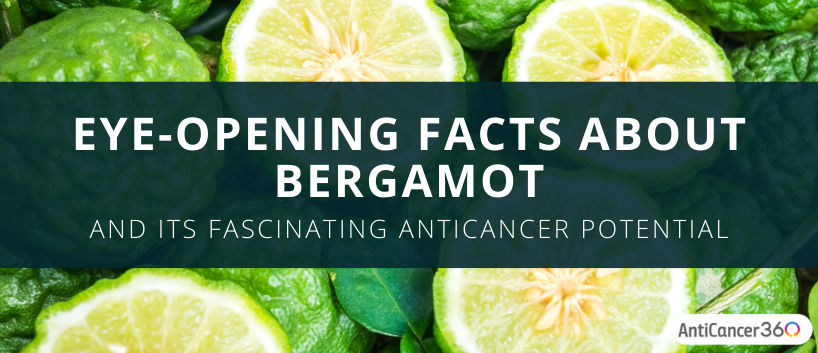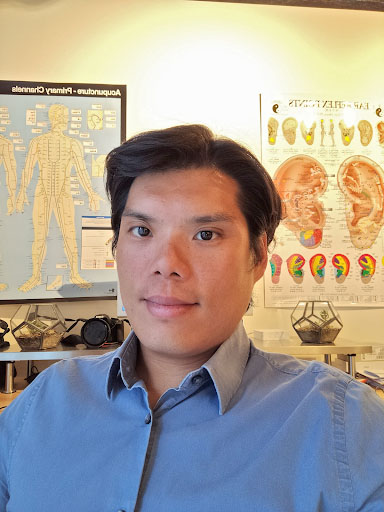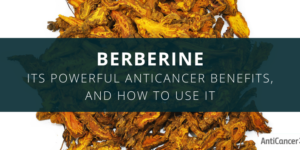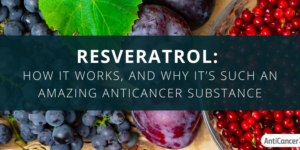When you are battling cancer, you want to fuel your body in the best way possible. Fortunately, there are ways to support your body so that your healthy cells are not only protected, but also equipped with powerful anticancer tools. And while there is a wealth of potential anticancer substances that come from nature, many of them come in the form of plants and plant compounds.
Overall, plant extracts can be taken as dietary supplements. This not only makes them more convenient to take, but standardized extracts also allow for consistency in terms of achieving therapeutic levels in the bloodstream.
But, so many products claim to provide potential anticancer benefits… and it can be overwhelming to know what to choose and which ones are safe in your fight against cancer. Because of this, we want to bring you the best information possible, and make it less overwhelming for you.
So today we’ll show you the science behind the anticancer potential of bergamot and how to take it.
Overall, bergamot is an anticancer substance that can help starve cancer cells, and can be used in addition to your oncologists’ treatments. And depending on your individual situation, bergamot may be a beneficial option that can help you fight cancer from every direction.
What Is Bergamot?
Bergamot is a fragrant citrus fruit from the plant Citrus bergamia, and its essential oils are extracted from the fruit’s peel.
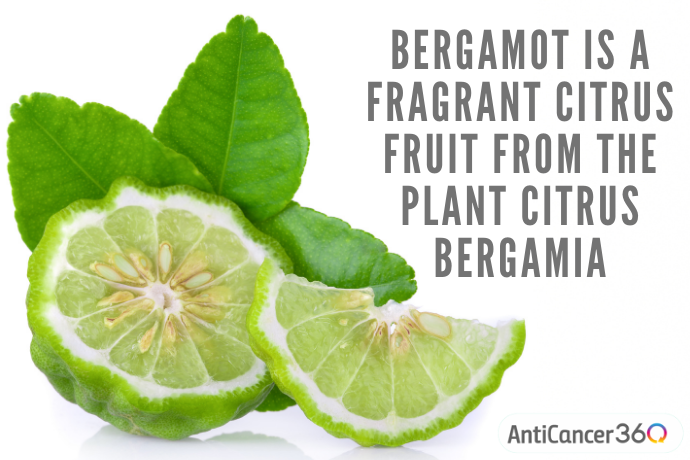
Bergamot is probably most well-known for giving Earl Grey tea its signature flavor and citrusy aroma. It may also contribute to the antioxidant benefits linked to this type of tea [1],[2].
Bergamot May Support Healthy Cholesterol Levels
Emerging scientific evidence suggests a promising role of bergamot flavonoids in managing metabolic diseases, due to their antioxidant, anti-inflammatory, and potential anticancer effects [3].
Bergamot may help support healthy cholesterol levels. Most clinical research shows that taking bergamot reduces low-density lipoprotein (LDL) cholesterol levels in animals and people with high cholesterol [3].
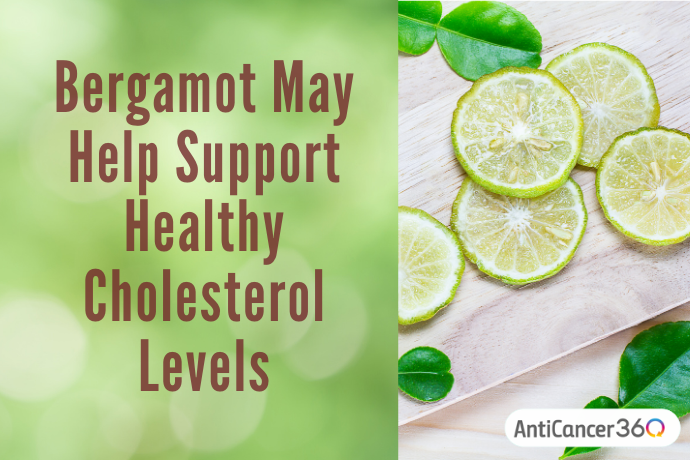
Our liver naturally makes all the cholesterol our bodies need. In addition to this, more cholesterol comes from diets that include meats and dairy products. Cholesterol and other fats are carried in your bloodstream as lipoproteins.
Scientists have determined that bergamot works similarly to the drug class known as the “statins.” Statins are the leading prescribed medication for the treatment of high cholesterol. Some examples include Lipitor (atorvastatin) and Zocor (simvastatin).
The bergamot’s chemical structure is similar to that of statins, and both block an enzyme known as HMG-CoA reductase. This effectively blocks the rate-limiting step in cholesterol production and leads to lower cholesterol levels in the bloodstream [3].
Statins, among other drugs, are sometimes prescribed “off-label” for their anticancer potential. Off-label prescribing is when healthcare providers use medications to treat conditions other than their original FDA-approved purpose.
Numerous studies have demonstrated the anticancer benefits of statins in various tumor types. And although more research is needed, many breast cancer and colorectal cancer studies have suggested a link between statin use and lower cancer risk [4].
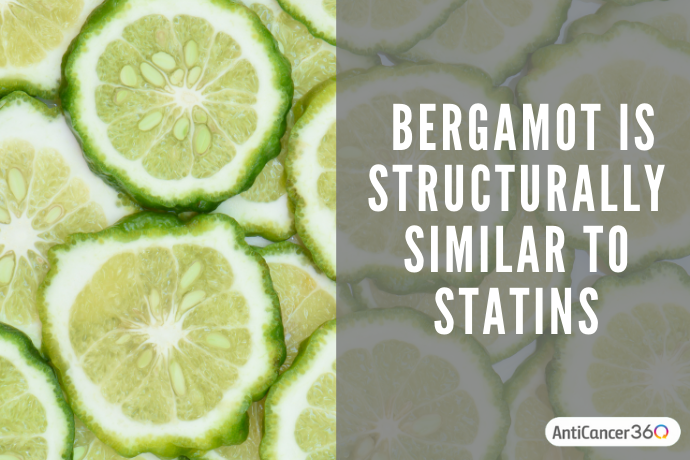
Since statins may have anticancer effects, and bergamot is structurally similar to statins… we can next explore the science behind bergamot… and how it can play a role in preventing or fighting cancer.
Cancer Metabolism Suppression: How To Starve Cancer With Bergamot
Cancer metabolism is the process by which cancer makes energy from nutrients like sugar, fat, and protein. Starving cancer with drugs and natural supplements is a crucial strategy when you are fighting cancer in every direction.
We can use certain supplements to try to prevent sugar, fats, and proteins from nourishing cancer cells. This strategy weakens cancer cells to make them more vulnerable to treatments. Fortunately, bergamot is a natural substance that shows incredible potential in blocking cancer metabolism.
Bergamot May Block Cancer Metabolism Of Glucose
So, we know that cancer cells typically need a lot of energy for their rapid growth. And to satisfy their high-demand energy needs, cancer cells require a lot of sugar (glucose). Glucose is also the dominant fuel source for most types of cancers.
An interesting study published in 2015 found that bergapten, a flavonoid isolated from bergamot oil, alters both glucose and fat metabolism in breast cancer cells, ultimately causing cell death (apoptosis) [5].
The researchers’ analysis showed that bergamot may affect oxidative phosphorylation, an energy-generating process that cancers can use to survive.
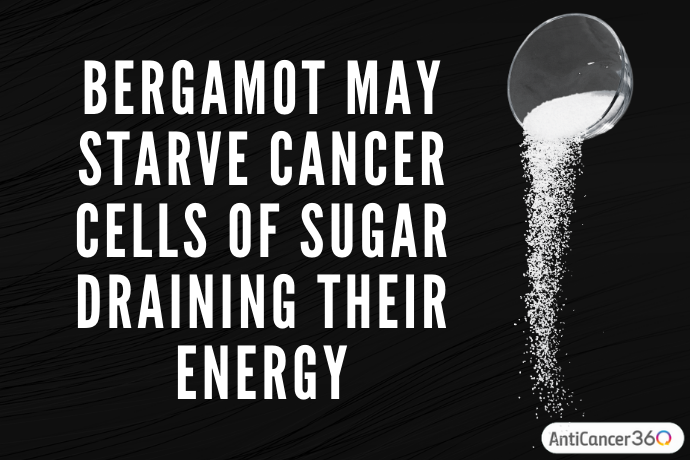
Oxidative phosphorylation (OxPHOS) is the metabolic process in which nutrients like glucose are transformed into chemical energy. Phosphorylation is a chemical process that involves adding a phosphate group to an organic compound so that cells may use it.
Specifically, OxPHOS is the addition of phosphate to adenosine diphosphate (ADP) to form adenosine triphosphate (ATP). OxPHOS takes place in the inner membrane of the mitochondria of each cell, and ATP is the primary energy source for all cells of living organisms [6].
Bergamot seems to slow down OxPHOS, helping to drain energy from cancer cells. And without adequate energy for the cancer cells, cell death occurs.
Bergamot also has been shown to support lower blood sugar levels. In a clinical study of 237 people, bergamot extract was given as a daily oral supplement. And after 30 days, the researchers observed that, on average, the people in the study had significant decreases in their blood sugar and cholesterol levels [7].
Bergamot Interferes With Cancer Metabolism Of Fats
Fats (lipids, fatty acids, and cholesterol) are also essential energy sources in the human body. The metabolism of fats affects many fundamental cell processes, including cell growth, proliferation, and survival. So, the ability of some cancer cells to reprogram their fat metabolism plays a significant role in cancer progression.
Cancer cells are dependent on cholesterol to build tumor cell membranes. Fatty acids are the building blocks of cholesterol. A strategy in fighting cancer is to find ways to block the production (synthesis) of cholesterol from fatty acids… and bergamot may help with this.
As we discussed earlier, clinical data and population studies support the concept that decreased cholesterol levels are associated with reductions in cancer and cancer-related deaths.
Research shows that bergamot can block cholesterol production in breast cancer cells by targeting fatty acid oxidation (FAO) [8].
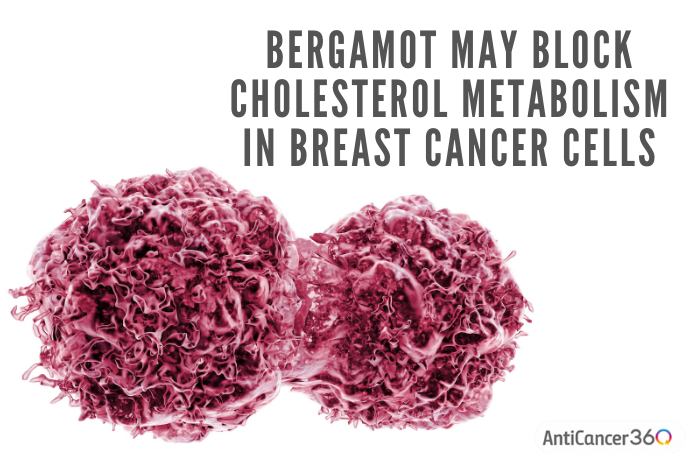
FAO is the process of chemically breaking down a fatty acid into smaller pieces called acetyl-CoA units. And bergamot blocks FAO, the HMG-CoA-reductase enzyme cannot perform its normal function of converting acetyl-CoA into cholesterol. Without cholesterol, tumors cannot build their cell membranes or continue to grow. And bergamot, a citrus fruit, is amazingly responsible for this anticancer action.
Bergamot’s Anticancer Effects On Cancer Stem Cells
Bergamot may also have the ability to fight against cancer stem cells. Cancer stem cells (CSCs) are a small percentage of the total cancer cell population, but they are thought of as the driving force. They play a critical role in initial cancer formation, progression, drug resistance, and cancer recurrence.
Since CSCs tend to survive existing cancer treatments, new research is focused on targeting the signaling pathways that involve CSCs [9].
The mevalonate pathway is a CSC signaling pathway. The mevalonate pathway is also known as the HMG-CoA reductase pathway. We mentioned this enzyme earlier as having a crucial role in cholesterol production, which is required for the continued construction of cancer cell membranes.
Numerous studies have shown the cancer-growth-stopping action of statin drugs against both cancer cells and cancer stem cells (CSCs). Statins are strong inhibitors of HMG-CoA reductase, an enzyme in the mevalonate pathway that leads to cholesterol production.
Statin drugs are generally considered safe, but many people cannot tolerate them due to their side effects. Statin drugs can cause muscle-related issues, such as muscle pain, weakness, or cramping, in 7% to 29% of people who take them [10].
In an exciting study published in 2018, bergamot flavonoid extracts were compared to the activity of two FDA-approved statin drugs, pravastatin and simvastatin, on breast CSCs. The scientists observed that bergamot blocked fatty acid oxidation, blocked HMG-CoA reductase, and interrupted several CSC signaling pathways. And, bergamot imposed these anticancer actions on breast CSCs without causing the same toxic side effects in healthy fibroblast cells that were observed with statins [8].
The authors of this study concluded that, compared to statins, “[bergamot] may be a more effective, non-toxic, all-natural, therapeutic for the eradication of cancer stem cells, via mevalonate pathway inhibition.” [8]
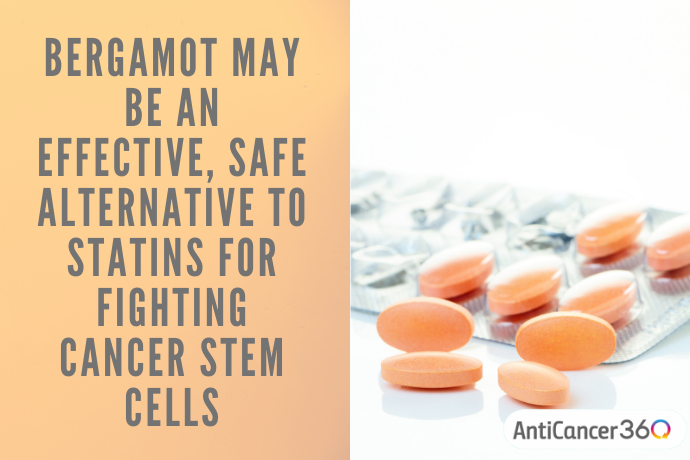
Bergamot, at normal dosages, is not harmful to healthy cells. It can block cancer cell metabolism and pathways through multiple mechanisms, making it an excellent potential anticancer tool.
How To Use Bergamot: Dosages, Side Effects, And Precautions
Dosage
Bergamot supplements are usually taken as 500 mg oral tablets or capsules, one or two times daily. Bergamot is also available as an essential oil that may be applied topically to the skin or inhaled as aromatherapy as needed [2].
Side Effects
Bergamot is generally safe and non-toxic when taken as an oral supplement.
Increased sensitivity to sunlight can also occur with bergamot, mainly when bergamot oil is applied to the skin, and particularly in fair-skinned people. Precautions should be taken to protect against sunburn [2].
Interactions With Drugs And Supplements
Many unknown potential drug interactions can happen with bergamot, especially with chemotherapy and other cancer treatments. This is not a comprehensive list of possible interactions.
- Antidiabetic medications or supplements. Bergamot might decrease blood sugar. Taking bergamot along with diabetes medications, such as metformin or insulin, or certain supplements, such as berberine or fenugreek, might cause your blood sugar to go too low. Monitor your blood sugar closely. The dose of your diabetes medications or supplements might need to be changed.
- Medications that increase sensitivity to sunlight. Some medications can increase sensitivity to sunlight. The topical use of bergamot oil might also increase your sensitivity to sunlight. Bergamot could increase the chances of sunburn or rashes on areas of skin exposed to sunlight. Be sure to wear sunscreen and protective clothing when spending time in the sun.
You must consult with your doctor or pharmacist before including any supplements in your program.
Aggressive Integrative Approach With Bergamot
Ultimately, you can see that there can be many potential benefits to adding a natural dietary supplement like bergamot to your overall anticancer program.
When using the “Aggressive Integrative Approach” to cancer, the goal is to fight cancer from every possible angle. This approach includes integrating natural supplements to fight cancer based on available evidence, despite limited human data, and to do it in a way that won’t interfere with your oncology treatments.
Will Bergamot Strengthen Your Personal Battle With Cancer?
Now… we would love to hear from you. How are you approaching your treatments? What are you doing to support your body? Are you taking bergamot, or any other supplements? Let us know in the comments below!
If you’re interested in using an Aggressive Integrative Approach for your case… you can learn more about our program by watching one of our free online webinars.
Please discuss the risk-versus-benefit potential with your healthcare provider before starting any natural supplement, including bergamot.
Are You A Candidate For Our Program?
If you’d like to learn more about the AntiCancer360 approach and see if we can help you… please watch our free online webinar to learn more about our approach. Then at the end, you’ll be able to schedule a free call with someone from our team so that we can discuss your case in more detail.
Dr. Patricia Weiser is one of AntiCancer360’s consultant pharmacists, science advisors, and medical writers. Her expertise helps us create safe herbal and supplement combinations and avoid potential drug interactions.
Patricia is a graduate of the University of Pittsburgh and a licensed pharmacist. She has clinical experience in both community and hospital pharmacy. She is passionate about integrative and preventative care and strives to empower her patients to take an active role in their health.

